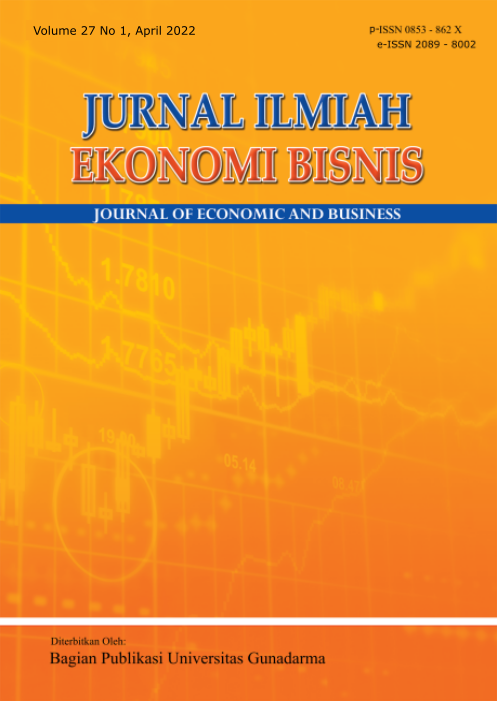HUBUNGAN ANTARA MANAJEMEN PENGETAHUAN DAN KEBERLANJUTAN ORGANISASI: PERAN SERTIFIKASI ISO 9001
Sekolah Tinggi Ilmu Ekonomi Banten
Indonesia
Pemerintah Prov. Banten
Indonesia
Abstract
Keywords
References
Abdullah, H. S., & Ahmad, J. (2009). The fit between organisational structure, management orientation, knowledge orientation, and the values of ISO 9000 standard: A conceptual analysis. International Journal of Quality & Reliability Management, 26(8), 744–760. doi: 10.1108/02656710910984147.
Agus, P., Putri R. S., Ahmad, A.H., Asbari, M., Bernarto, I., Santoso P. B., & Sihite, O. B. (2020). The effect of implementation integrated management system ISO 9001, ISO 14001, ISO 22000 and ISO 45001 on Indonesian food industries performance. TEST Engineering and Management, 82(20), 14054–14069.
Brito, E., Pais, L., dos Santos, N. R., & Figueiredo, C. (2020). Knowledge management, customer satisfaction and organizational image discriminating certified from non-certified (ISO 9001) municipalities. International Journal of Quality and Reliability Management, 37(3), 451–469. doi: 10.1108/IJQRM-10-2018-0281.
Carayannis, E. G., Sindakis, S., & Walter, C. (2015). Business model innovation as lever of organizational sustainability. Journal of Technology Transfer, 40(1), 85–104. doi: 10.1007/s10961-013-9330-y.
Celik, B., & Olcer, O. H. (2018). What is the contribution of ISO 9001 quality management system to educational institutions?. International Journal of Academic Research in Business and Social Sciences, 8(6), 445–462. doi: 10.6007/ijarbss/v8-i6/4250.
Cepeda-Carrion, I., Martelo-Landroguez, S., Leal-Rodríguez, A. L., & Leal-Millán, A. (2017). Critical processes of knowledge management: An approach toward the creation of customer value. European Research on Management and Business Economics, 23(1), 1–7. doi: 10.1016/j.iedeen.2016.03.001.
Chin, W. W., Marcelin, B. L., & Newsted, P. R. (2003). A partial least squares latent variable modeling approach for measuring interaction effects: Results from a Monte Carlo simulation study and an electronic-mail emotion/adoption study. Information Systems Research, 14(2). doi: 10.1287/isre.14.2.189.16018.
Chou, S. W. (2005). Knowledge creation: Absorptive capacity, organizational mechanisms, and knowledge storage/retrieval capabilities. Journal of Information Science, 31(6), 453–465. doi: 10.1177/0165551505057005.
Darroch, J. (2005). Knowledge management, innovation and firm performance. Journal of Knowledge Management, 9(3), 101–115. doi: 10.1108/13673270510602809.
Demir, A., Budur, T., Omer, H. M., & Heshmati, A. (2021). Links between knowledge management and organisational sustainability: does the ISO 9001 certification have an effect?. Knowledge Management Research and Practice, 1–14. doi: 10.1080/14778238.2020.1860663.
Demir, A., & Guven, S. (2017). The influence of ISO certificate on quality evaluation of students: A case study st Ishik University. Advances in Social Sciences Research Journal, 4(3), 171–180. doi: 10.14738/assrj.43.2715.
Dhir, S., & Dutta, T. (2020). Linking supervisor-support, person-job fit and person-organization fit to company value. Journal of Indian Business Research, 12(4), 549–561. doi: 10.1108/JIBR-04-2019-0124.
Dzenopoljac, V., Alasadi, R., Zaim, H., & Bontis, N. (2018). Impact of knowledge management processes on business performance: Evidence from Kuwait. Knowledge and Process Management, 25(2), 77–87. doi: 10.1002/kpm.1562.
Fonseca, L., & Domingues, J. P. (2017). ISO 9001:2015 edition- management, quality and value. International Journal for Quality Research, 11(1), 149–158. doi: 10.18421/IJQR11.01-09.
Fornell, C., & Larcker, D. F. (1981). Structural equation models with unobservable variables and measurement error: algebra and statistics. Journal of Marketing Research, 18(3), 382-388. doi: 10.2307/3150980.
Gloet, M. (2006). Knowledge management and the links to HRM: developing leadership and management capabilities to support sustainability. Management Research News, 29(7), 402–413. doi: 10.1108/01409170610690862.
Hair, J. F., Ringle, C. M., & Sarstedt, M. (2011). PLS-SEM: Indeed a silver bullet. Journal of Marketing Theory and Practice, 19(2), 139–152. doi:10.2753/MTP1069-6679190202.
Hair, Joe F., Sarstedt, M., Hopkins, L., & Kuppelwieser, V. G. (2014). Partial least squares structural equation modeling (PLS-SEM): An emerging tool in business research. European Business Review, 26(2), 106–121. doi: 10.1108/EBR-10-2013-0128.
Hair, Joseph F., Sarstedt, M., & Ringle, C. M. (2019). Rethinking some of the rethinking of partial least squares. European Journal of Marketing, 53(4), 566–584. doi: 10.1108/EJM-10-2018-0665.
Henseler, J., Ringle, C. M., & Sarstedt, M. (2015). A new criterion for assessing discriminant validity in variance-based structural equation modeling. Journal of the Academy of Marketing Science, 43(1), 115–135. doi: 10.1007/s11747-014-0403-8.
Hussi, T. (2004). Reconfiguring knowledge management – combining intellectual capital, intangible assets and knowledge creation. Journal of Knowledge Management, 8(2), 36–52. doi: 10.1108/13673270410529091.
Indarti, N., & Dyahjatmayanti, D. (2015). Manajemen pengetahuan: Teori dan praktik (2nd ed.). Yogyakarta: Gadjah Mada University Press.
Inkinen, H. T., Kianto, A., & Vanhala, M. (2015). Knowledge management practices and innovation performance in Finland. Baltic Journal of Management, 10(4), 432–455. doi:10.1108/BJM-10-2014-0178.
Ismail, I. R., Tajuddin, N., & Yunus, N. K. M. (2019). Trust and intention to share as predictors of online knowledge-sharing behavior. Proceedings of the Regional Conference on Science, Technology and Social Sciences (RCSTSS 2016). Singapore: Springer Singapore. doi:10.1007/978-981-13-0203-9.
Jorna, R. J., Hadders, H., & Faber, N. (2009). Sustainability, learning, adaptation and knowledge processing. In book: Knowledge management and organizational learning (pp. 369–384). doi:10.1007/978-1-4419-0011-1_20.
Kamasak, R. (2017). The contribution of tangible and intangible resources, and capabilities to a firm’s profitability and market performance. European Journal of Management and Business Economics, 26(2), 252–275. doi:10.1108/EJMBE-07-2017-015.
Karamustafa, K., & Ülker, P. (2020). Impact of tangible and intangible restaurant attributes on overall experience: A consumer oriented approach. Journal of Hospitality Marketing and Management, 29(4), 404–427. doi:10.1080/19368623.2019.1653806.
Khalifa, M., & Liu, V. (2003). Determinants of successful knowledge management program. Electronic Journal on Knowledge Management, 1(2), 103-112.
Liebowitz, J. (2001). Knowledge management and its link to artificial intelligence. Expert Systems with Applications, 20(1), 1–6. Retrieved from http://www.sciencedirect.com.library.capella.edu/science/article/pii/S0957417400000440.
Martelo-Landroguez, S., & Cegarra-Navarro, J. G. (2014). Linking knowledge corridors to customer value through knowledge processes. Journal of Knowledge Management, 18(2), 342–365. doi:10.1108/JKM-07-2013-0284.



